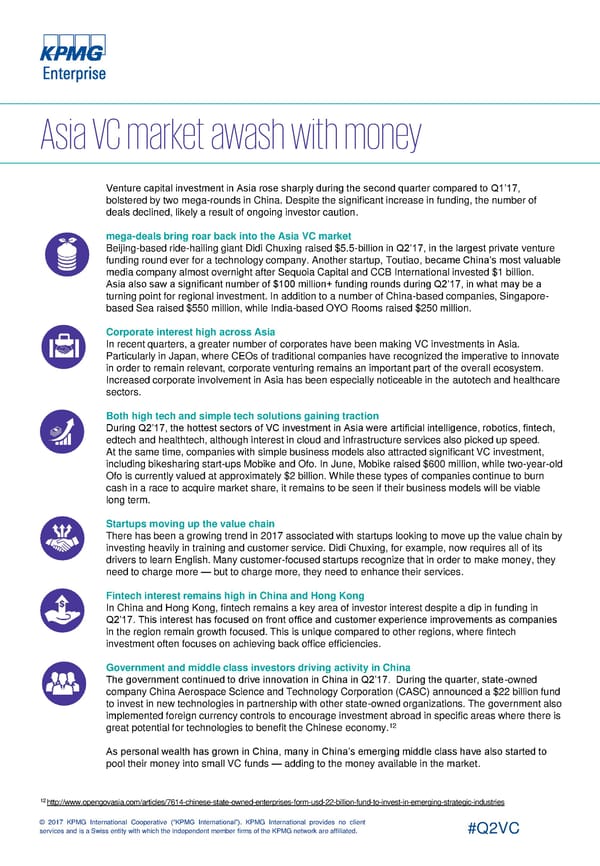Venture capital investment in Asia rose sharply during the second quarter compared to Q1’17, bolstered by two mega-rounds in China. Despite the significant increase in funding, the number of deals declined, likely a result of ongoing investor caution. mega-deals bring roar back into the Asia VC market Beijing-based ride-hailing giant Didi Chuxing raised $5.5-billion in Q2’17, in the largest private venture funding round ever for a technology company. Another startup, Toutiao, became China’s most valuable media company almost overnight after Sequoia Capital and CCB International invested $1 billion. Asia also saw a significant number of $100 million+ funding rounds during Q2’17, in what may be a turning point for regional investment. In addition to a number of China-based companies, Singapore- based Sea raised $550 million, while India-based OYO Rooms raised $250 million. Corporate interest high across Asia In recent quarters, a greater number of corporates have been making VC investments in Asia. Particularly in Japan, where CEOs of traditional companies have recognized the imperative to innovate in order to remain relevant, corporate venturing remains an important part of the overall ecosystem. Increased corporate involvement in Asia has been especially noticeable in the autotech and healthcare sectors. Both high tech and simple tech solutions gaining traction During Q2’17, the hottest sectors of VC investment in Asia were artificial intelligence, robotics, fintech, edtech and healthtech, although interest in cloud and infrastructure services also picked up speed. At the same time, companies with simple business models also attracted significant VC investment, including bikesharing start-ups Mobike and Ofo. In June, Mobike raised $600 million, while two-year-old Ofo is currently valued at approximately $2 billion. While these types of companies continue to burn cash in a race to acquire market share, it remains to be seen if their business models will be viable long term. Startups moving up the value chain There has been a growing trend in 2017 associated with startups looking to move up the value chain by investing heavily in training and customer service. Didi Chuxing, for example, now requires all of its drivers to learn English. Many customer-focused startups recognize that in order to make money, they need to charge more — but to charge more, they need to enhance their services. Fintech interest remains high in China and Hong Kong In China and Hong Kong, fintech remains a key area of investor interest despite a dip in funding in Q2’17. This interest has focused on front office and customer experience improvements as companies in the region remain growth focused. This is unique compared to other regions, where fintech investment often focuses on achieving back office efficiencies. Government and middle class investors driving activity in China The government continued to drive innovation in China in Q2’17. During the quarter, state-owned company China Aerospace Science and Technology Corporation (CASC) announced a $22 billion fund to invest in new technologies in partnership with other state-owned organizations. The government also implemented foreign currency controls to encourage investment abroad in specific areas where there is great potential for technologies to benefit the Chinese economy.12 As personal wealth has grown in China, many in China’s emerging middle class have also started to pool their money into small VC funds — adding to the money available in the market. 12 http://www.opengovasia.com/articles/7614-chinese-state-owned-enterprises-form-usd-22-billion-fund-to-invest-in-emerging-strategic-industries © 2017 KPMG International Cooperative (“KPMG International”). KPMG International provides no client services and is a Swiss entity with which the independent member firms of the KPMG network are affiliated. #Q2VC
 Asia Page 1 Page 3
Asia Page 1 Page 3